Last month, we profiled the successful recipients of this year’s PWE Travel Bursary, in association with the Agricultural Science Associatiion, the Irish Farmers Journal, Seedtech and Tirlan. This week, the students update us on what they have been up to over the last month.
Read about some of the experiences they have gained.
Rory Mulry
University College Dublin
Canada
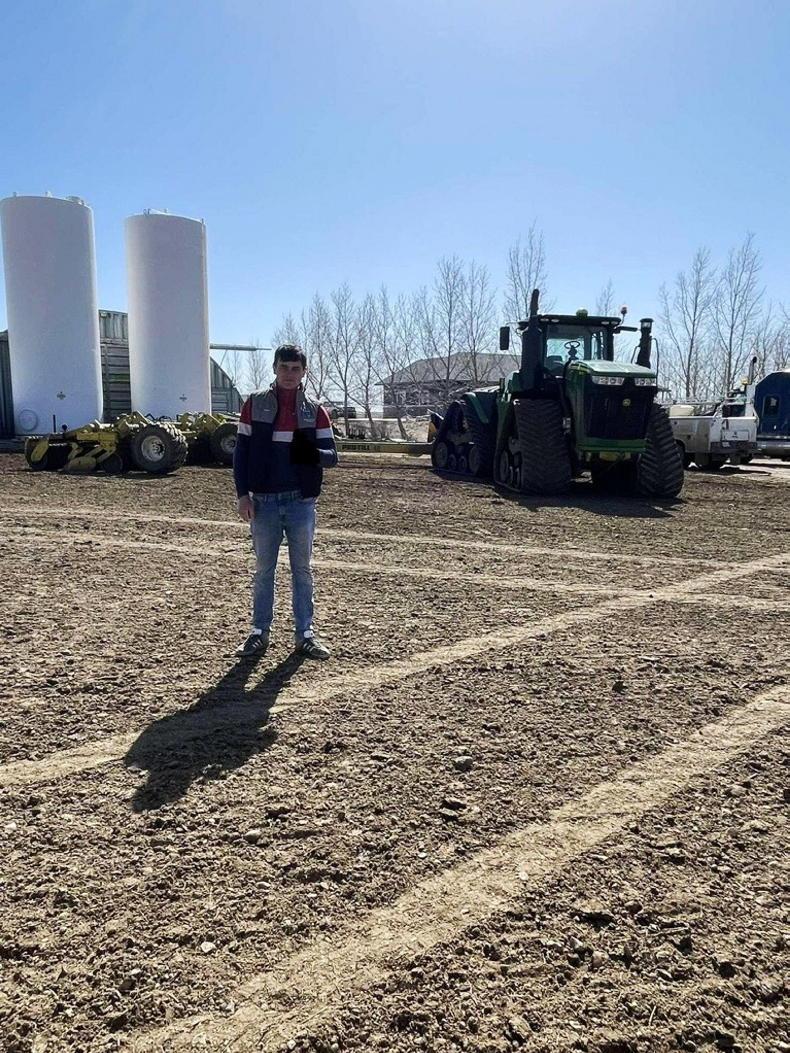
Rory Mulry on PWE
“My placement so far in Canada has involved the calving of Dustin’s Hawkin’s 750 cows. Calving began in early March and ran through until mid-April. At peak times 30-40 cows were calving a day.
“Some of the sheer differences on the farm here in Kincaid to beef and tillage farms at home include most of the cows calving outdoors. The next day pairs are sorted off depending on the gender of the calf. The primary breed of the 750 cows is Angus.
“This year Dustin bought an additional 15 Hereford bulls to add to the already existing group of 40 Angus bulls. On the tillage side, the main differences include the immense size and scope of the land, machinery used and the different tillage practices used. Canada rents and sells land by the quarter, which equals 160ac. Hence, a field size is a minimum of 160ac and often much bigger with Dustin’s biggest field that we seeded this year being 1280ac. Crops sown included wheat, barley, oats, rape, peas and lentils.
Mark Norse
University College Dublin
New Zealand
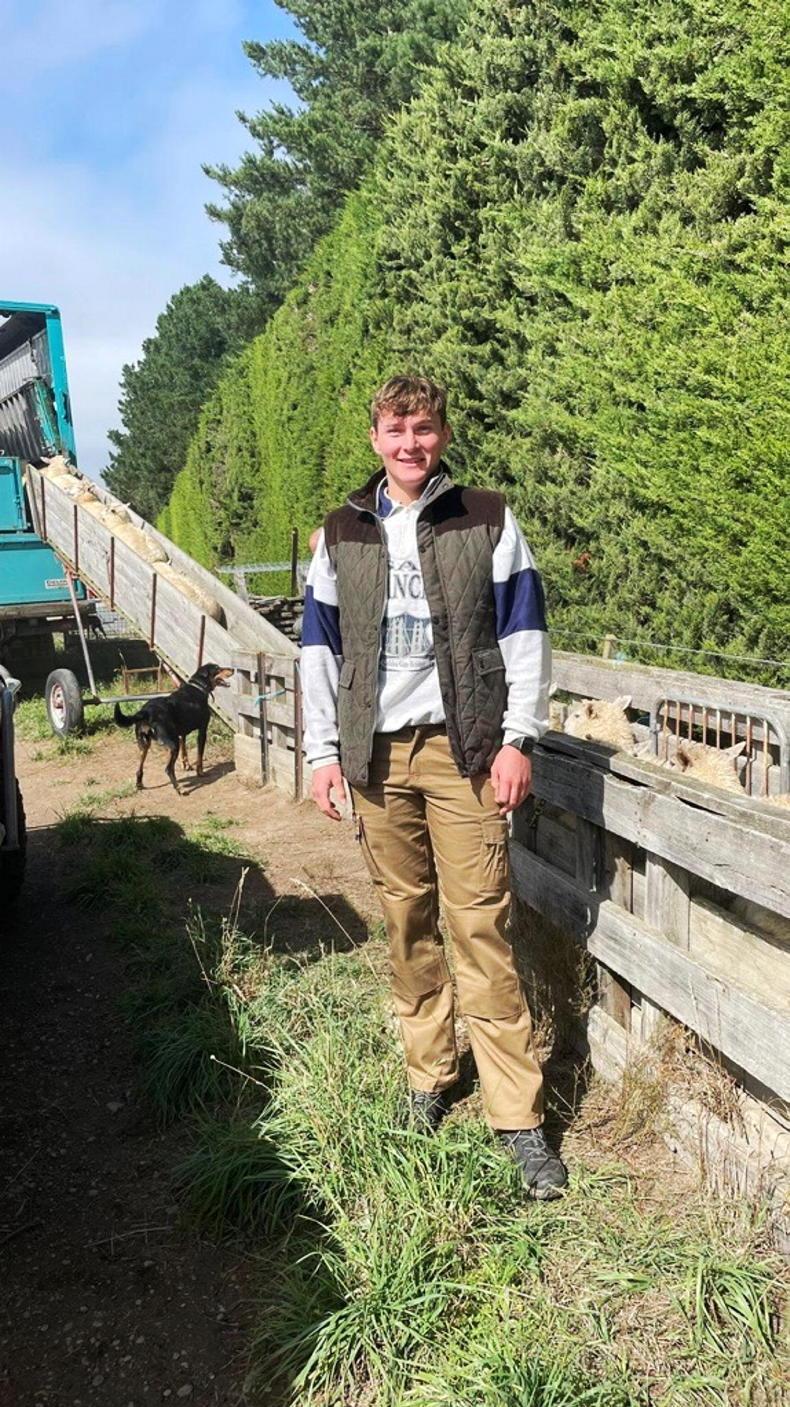
Mark Norse on PWE.
“Working at Alliance, one of New Zealand’s largest red meat processors, for the last couple of months has been so interesting. I have acquired a vast range of information in relation to the global food and agriculture sector. I am still based in the head office in Christchurch and am carrying out my daily tasks but have been lucky to get out and see other aspects of the business.
“I have gotten the opportunity to attend several conferences, one of which I flew down to in Invercargill - which is in the most southern part of New Zealand - where I attended a conference about how farmers can deal with periods of drought.
“There was also a farmer discussion panel and a farm visit where we got to see examples in practice of crops and breeds of sheep being used. Christopher Luxon, the leader of the National Party, spoke at the event also. It was a pleasure to meet and speak with him personally, especially in relation to young farmers and how they try to encourage them into the industry here in New Zealand.
“At peak season 2,000 people are working at the plant each day with the capacity to kill and process up to 32,000 lambs per day on eight kill chains, although it has not run at this level of output for some time due to the national reduction of flock size. I was given a walkthrough of the whole sheep processing plant from the stockyards to the end packaged product. The scale of the infrastructure is immense compared to anything in Ireland. My visit to the plant was a valuable experience.
Sean Rafty -
South East Technological
University
New Zealand
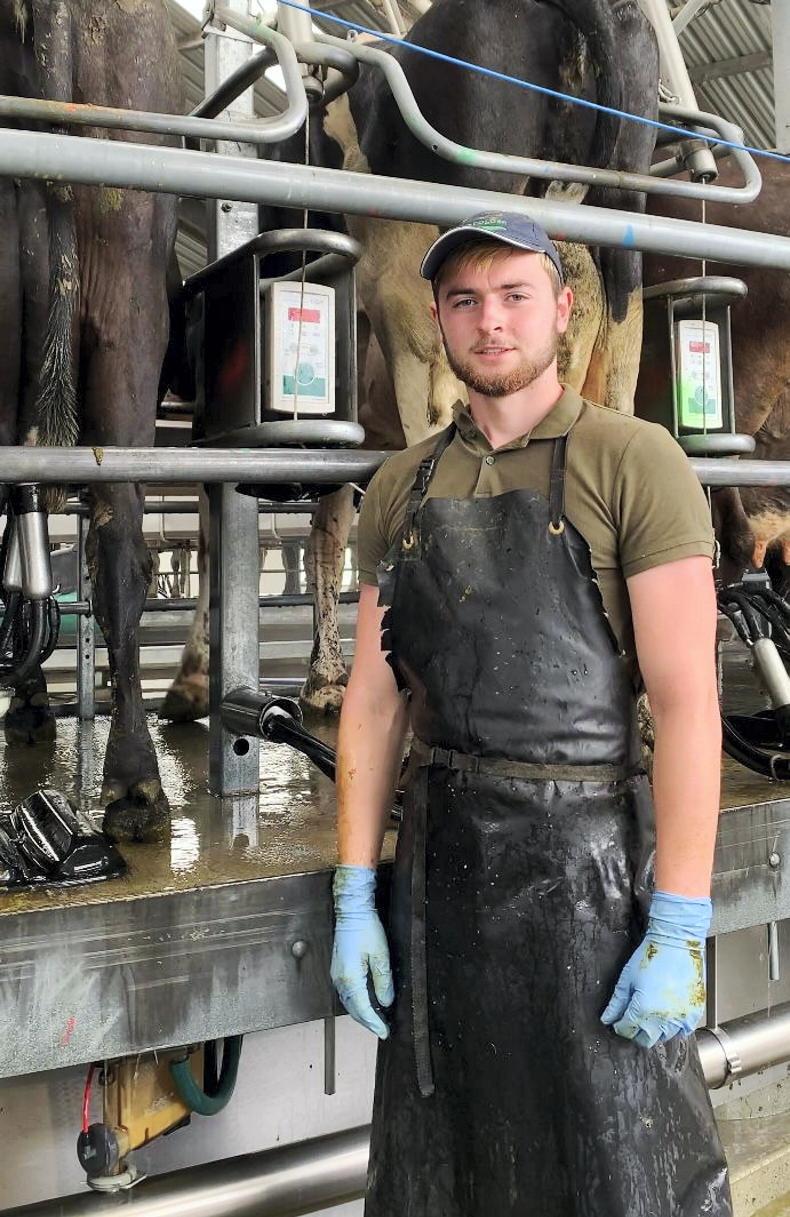
Sean Rafty (SETU) on PWE in New Zealand
“The farm I am placed on is Quigley farming in Ashburton. It has 900 cows with roughly half calving in autumn and half calving in spring. It is managed by two managers and three farm workers.
“So far New Zealand has been a great learning experience. Dairy farming in New Zealand is very similar to Ireland. The farms in New Zealand are large scale by comparison, they are very well organised and managed well by a team, which makes it easy working with such a large herd. The majority of New Zealand dairy is grass-based systems just like
back home.
“I have learned a variety of new skills since coming to New Zealand. I have experienced new systems and techniques here such as outdoor calving.
“When I arrived, calving was just about to start and all cows calve outdoors. This system was interesting to experience as I have never seen it in action before. The outdoor calving made it very easy to manage such a large herd at calving time, there was less labour required. This allowed us to focus on other aspects of farming such as cow health, calf rearing, grass and general day-to-day work.
“On the farm, grass measuring is one of the main areas to focus on. The grass is very well managed and maintained. This is definitely one of the areas I have enjoyed learning more about.
“Getting to experience working with such a large herd of cows during calving has definitely been my favourite part. The managers are very considerate allowing for adequate time off. I work a roster of six days on, two off.
“New Zealand has been a brilliant experience and a worthwhile trip to see the system of farming on the far side of the world.”
Ciara Smith -
Dundalk Institute
of Technology
Germany
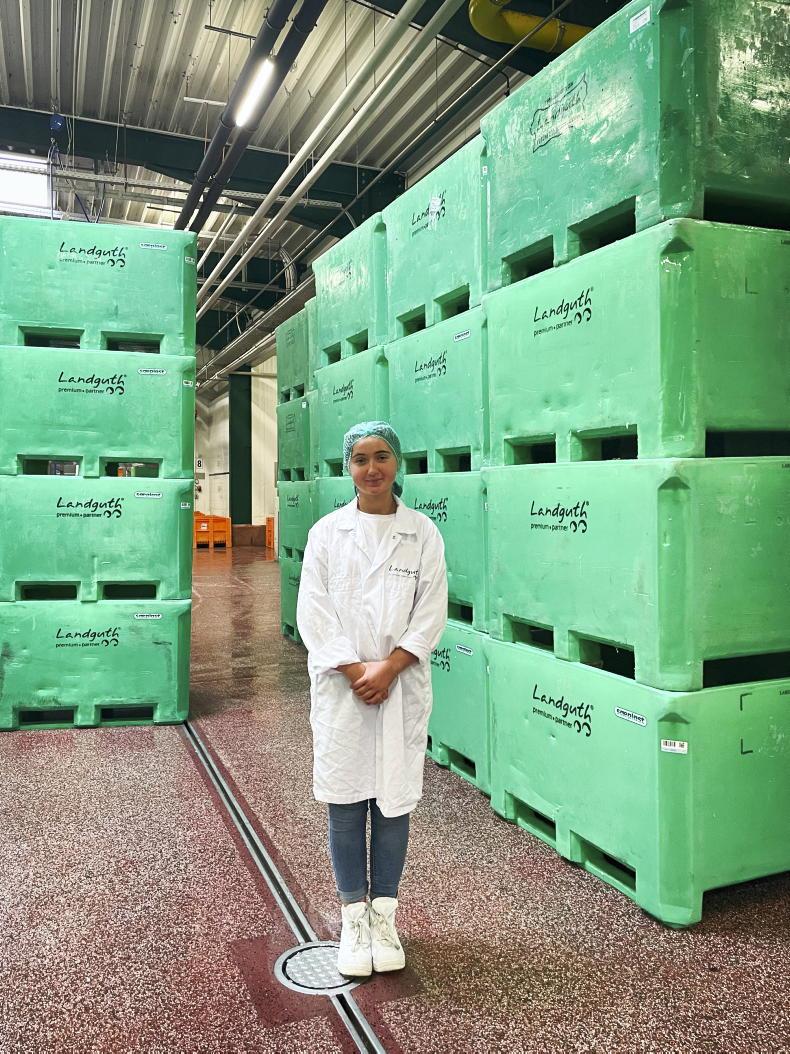
Ciara Smith on placement.
“Here in Emden Germany, I am currently in the third week of my internship at Landguth. Landguth Heimtiernahrung is a leading producer of its own brand of premium pet food. They take an initial idea and develop every aspect of the product from label design to recipe formation and ingredient content.
“I have now completed my first week in the product development department. Here I have seen what is involved in the development of a product from a concept. The key things I have learnt so far are the importance of understanding the end consumer, and also the importance of building a relationship of trust and responsibility between Landguth, the manufacturer and the retailer.
“My main job at the moment in the product department is quality evaluation. I have been given sole responsibility for conducting an evaluation of the fat content on the beef trimmings being supplied. This is a really exciting project for me, coming from a beef farm in Ireland, and I am thrilled to have been given the responsibility.
“This work differs considerably from our farm at home, where we have dairy cows, beef cattle and a poultry enterprise. The most valuable thing I have learnt here that I would see considerable value in implementing when I return is the structure of the work and how systems are developed to evaluate outcomes.
“Overall, it is all food for thought and I am thoroughly enjoying the experience.”
Cian Mongey
University College Dublin
Finland
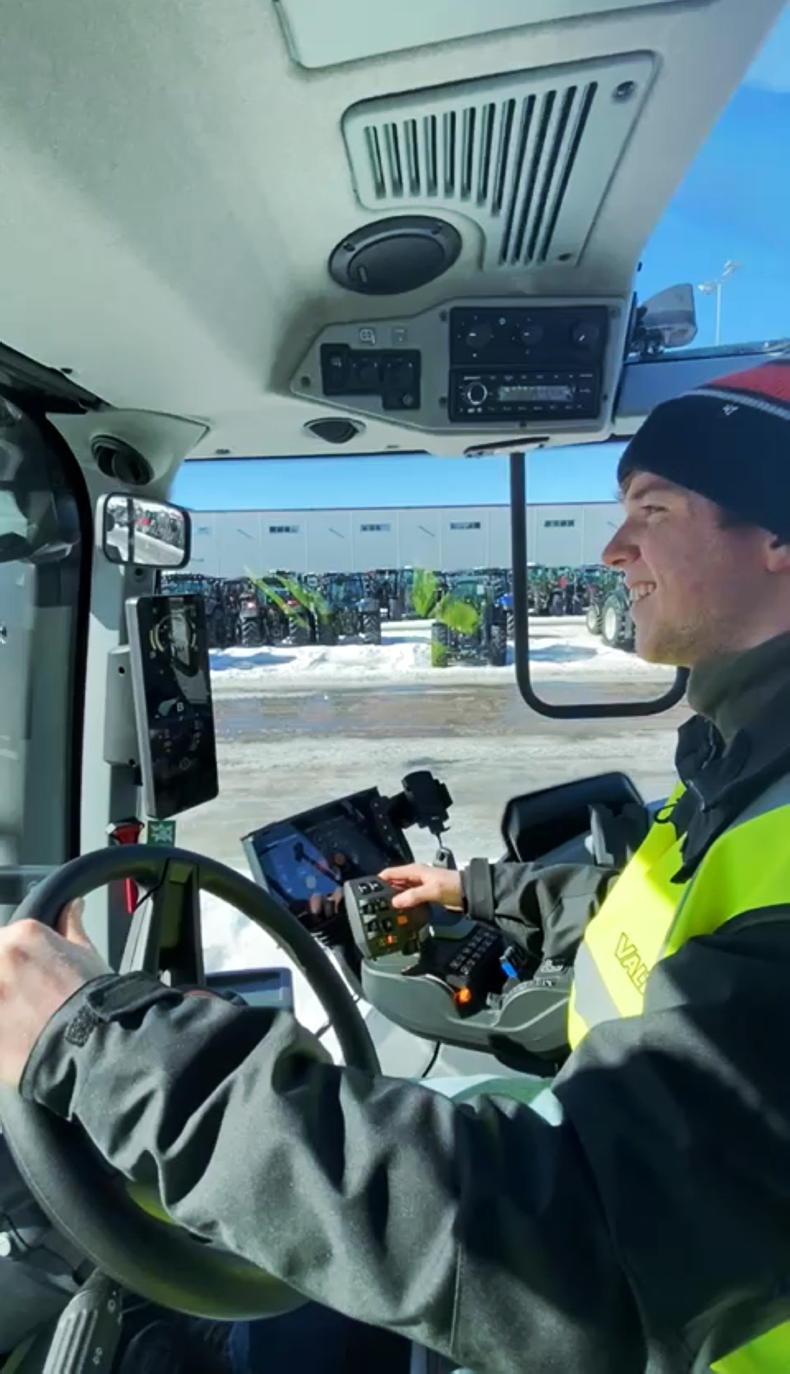
Cian Mongey on placement.
“After spending a little over two months now with AGCO’s Smart AG engineering team in central Finland, I must say that this placement opportunity has demonstrated the hard work and sheer determination of all who contribute to the production of agricultural machinery, from countless different departments and walks of life. The amount of work that is carried out behind the scenes is immense. A tractor is not just a powerful chunk of metal anymore. Especially, here at Valtra, the machines are carefully sculpted and crafted, with the end user always in mind. Establishing the correct balance of engineering and technology, these machines forge the forefront of tools for
the farmer.
“Coming from a dairy farm myself, corporate office life was never something I was familiar with, and was very unsure about coming in to. I love how every day on the farm is different, full of its challenges, but also the enjoyable times. As I like to be out and about, the idea of sitting in the office five days a week was a concern to me. However, I could not be happier with the way things are here. Our team has the flexibility to get work done, in an open and engaging way. Every day on the job has been different.
“To this day, my learnings have been invaluable. As each stage of the development of our products are mainly undertaken in-house, by our multi-talented team, I get the opportunity to work with some of the best and most highly skilled people from all different backgrounds and departments. From engineering and marketing, to agronomy and product management, my experience so far has broadened my knowledge and understanding of the agri-equipment and technology sector.”
Read more
Meet the travel bursary students on tour
Looking for a summer job? Here is what you need to know
Last month, we profiled the successful recipients of this year’s PWE Travel Bursary, in association with the Agricultural Science Associatiion, the Irish Farmers Journal, Seedtech and Tirlan. This week, the students update us on what they have been up to over the last month.
Read about some of the experiences they have gained.
Rory Mulry
University College Dublin
Canada

Rory Mulry on PWE
“My placement so far in Canada has involved the calving of Dustin’s Hawkin’s 750 cows. Calving began in early March and ran through until mid-April. At peak times 30-40 cows were calving a day.
“Some of the sheer differences on the farm here in Kincaid to beef and tillage farms at home include most of the cows calving outdoors. The next day pairs are sorted off depending on the gender of the calf. The primary breed of the 750 cows is Angus.
“This year Dustin bought an additional 15 Hereford bulls to add to the already existing group of 40 Angus bulls. On the tillage side, the main differences include the immense size and scope of the land, machinery used and the different tillage practices used. Canada rents and sells land by the quarter, which equals 160ac. Hence, a field size is a minimum of 160ac and often much bigger with Dustin’s biggest field that we seeded this year being 1280ac. Crops sown included wheat, barley, oats, rape, peas and lentils.
Mark Norse
University College Dublin
New Zealand

Mark Norse on PWE.
“Working at Alliance, one of New Zealand’s largest red meat processors, for the last couple of months has been so interesting. I have acquired a vast range of information in relation to the global food and agriculture sector. I am still based in the head office in Christchurch and am carrying out my daily tasks but have been lucky to get out and see other aspects of the business.
“I have gotten the opportunity to attend several conferences, one of which I flew down to in Invercargill - which is in the most southern part of New Zealand - where I attended a conference about how farmers can deal with periods of drought.
“There was also a farmer discussion panel and a farm visit where we got to see examples in practice of crops and breeds of sheep being used. Christopher Luxon, the leader of the National Party, spoke at the event also. It was a pleasure to meet and speak with him personally, especially in relation to young farmers and how they try to encourage them into the industry here in New Zealand.
“At peak season 2,000 people are working at the plant each day with the capacity to kill and process up to 32,000 lambs per day on eight kill chains, although it has not run at this level of output for some time due to the national reduction of flock size. I was given a walkthrough of the whole sheep processing plant from the stockyards to the end packaged product. The scale of the infrastructure is immense compared to anything in Ireland. My visit to the plant was a valuable experience.
Sean Rafty -
South East Technological
University
New Zealand

Sean Rafty (SETU) on PWE in New Zealand
“The farm I am placed on is Quigley farming in Ashburton. It has 900 cows with roughly half calving in autumn and half calving in spring. It is managed by two managers and three farm workers.
“So far New Zealand has been a great learning experience. Dairy farming in New Zealand is very similar to Ireland. The farms in New Zealand are large scale by comparison, they are very well organised and managed well by a team, which makes it easy working with such a large herd. The majority of New Zealand dairy is grass-based systems just like
back home.
“I have learned a variety of new skills since coming to New Zealand. I have experienced new systems and techniques here such as outdoor calving.
“When I arrived, calving was just about to start and all cows calve outdoors. This system was interesting to experience as I have never seen it in action before. The outdoor calving made it very easy to manage such a large herd at calving time, there was less labour required. This allowed us to focus on other aspects of farming such as cow health, calf rearing, grass and general day-to-day work.
“On the farm, grass measuring is one of the main areas to focus on. The grass is very well managed and maintained. This is definitely one of the areas I have enjoyed learning more about.
“Getting to experience working with such a large herd of cows during calving has definitely been my favourite part. The managers are very considerate allowing for adequate time off. I work a roster of six days on, two off.
“New Zealand has been a brilliant experience and a worthwhile trip to see the system of farming on the far side of the world.”
Ciara Smith -
Dundalk Institute
of Technology
Germany

Ciara Smith on placement.
“Here in Emden Germany, I am currently in the third week of my internship at Landguth. Landguth Heimtiernahrung is a leading producer of its own brand of premium pet food. They take an initial idea and develop every aspect of the product from label design to recipe formation and ingredient content.
“I have now completed my first week in the product development department. Here I have seen what is involved in the development of a product from a concept. The key things I have learnt so far are the importance of understanding the end consumer, and also the importance of building a relationship of trust and responsibility between Landguth, the manufacturer and the retailer.
“My main job at the moment in the product department is quality evaluation. I have been given sole responsibility for conducting an evaluation of the fat content on the beef trimmings being supplied. This is a really exciting project for me, coming from a beef farm in Ireland, and I am thrilled to have been given the responsibility.
“This work differs considerably from our farm at home, where we have dairy cows, beef cattle and a poultry enterprise. The most valuable thing I have learnt here that I would see considerable value in implementing when I return is the structure of the work and how systems are developed to evaluate outcomes.
“Overall, it is all food for thought and I am thoroughly enjoying the experience.”
Cian Mongey
University College Dublin
Finland

Cian Mongey on placement.
“After spending a little over two months now with AGCO’s Smart AG engineering team in central Finland, I must say that this placement opportunity has demonstrated the hard work and sheer determination of all who contribute to the production of agricultural machinery, from countless different departments and walks of life. The amount of work that is carried out behind the scenes is immense. A tractor is not just a powerful chunk of metal anymore. Especially, here at Valtra, the machines are carefully sculpted and crafted, with the end user always in mind. Establishing the correct balance of engineering and technology, these machines forge the forefront of tools for
the farmer.
“Coming from a dairy farm myself, corporate office life was never something I was familiar with, and was very unsure about coming in to. I love how every day on the farm is different, full of its challenges, but also the enjoyable times. As I like to be out and about, the idea of sitting in the office five days a week was a concern to me. However, I could not be happier with the way things are here. Our team has the flexibility to get work done, in an open and engaging way. Every day on the job has been different.
“To this day, my learnings have been invaluable. As each stage of the development of our products are mainly undertaken in-house, by our multi-talented team, I get the opportunity to work with some of the best and most highly skilled people from all different backgrounds and departments. From engineering and marketing, to agronomy and product management, my experience so far has broadened my knowledge and understanding of the agri-equipment and technology sector.”
Read more
Meet the travel bursary students on tour
Looking for a summer job? Here is what you need to know






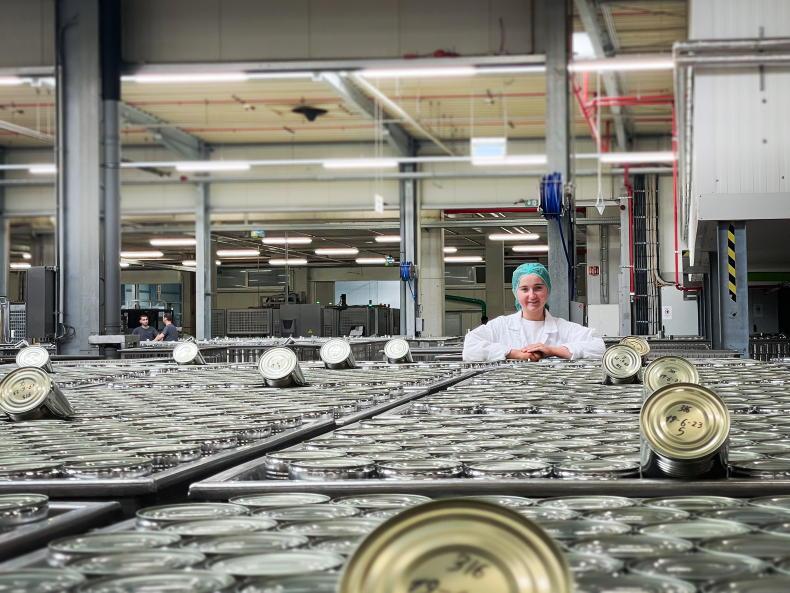




 This is a subscriber-only article
This is a subscriber-only article










SHARING OPTIONS: